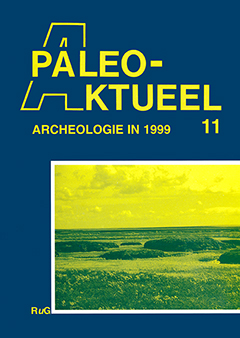AUGUSTEÏSCHE MUNTEN UIT EEN FRIESE TERP: VROEG-ROMEINSE MUNTEN UIT DE OPGRAVING WINSUM-BRUGGEBUREN (FR.)
Samenvatting
The small village of Winsum in the Dutch province of Friesland was long known for its pottery fragments dating to the Augustan/Tiberian period. Recently the Groningen lnsitute af Archaeology carried out an excavation in the remnants of the terp that had been quarried away completely for its fertile soil. The exavation brought to light much more early Roman pottery and Roman silver and copper coins. However, no militaria or traces of a defensed Roman camp were discovered. Still the finds do suggest same kind af Roman presence in this area. A similar site is Benturnersiel on the river Ems in Germany. Both sites are situated an the northern shores that were visited by the Roman army, as we know from historical sources. Maybe different tactics were used and smaller units were deployed in this area, where the presence of the Roman fleet also is attested by the historical sources. In future we shall have to look out for small indications pointing to the presence of the Roman army that are easily overlooked, as may be illustrated by a smalt coin. It appears to be a Roman as with the countermark of Varus, the army commander who lost a battle against the Germans in AD 9. The coin may have been lost by Roman soldiers who were active in the area but whose presence did not leave any clear traces in the salt-marsh landscape.

